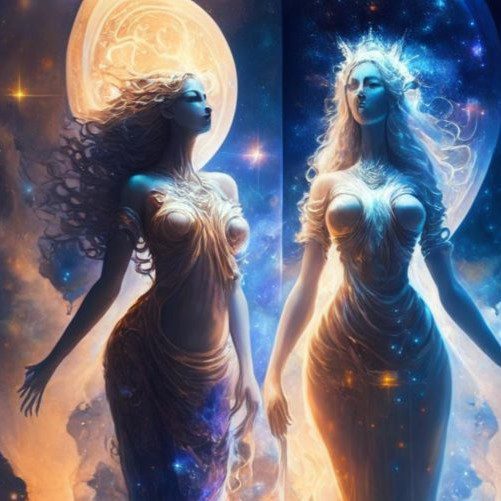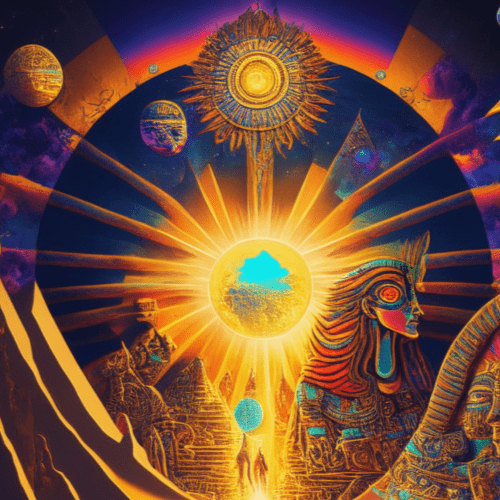10 Fascinating Gods of Sky Across World Mythologies
Since the dawn of civilization, humanity has gazed upward at the vast expanse of the heavens with awe and reverence. The sky, often seen as limitless and powerful, inspired countless myths across cultures. Many civilizations envisioned a god of sky—a supreme being who ruled over thunder, storms, stars, and celestial order. These deities were often seen as creators, protectors, or destroyers, holding dominion over life and fate itself.
Here’s a list of some of the most fascinating sky gods from around the world, each shaping their culture’s beliefs and stories in unique ways.
1. Zeus – The Greek God of the Sky
When we think of the god of sky, Zeus immediately comes to mind. As the king of the Olympians in Greek mythology, he wielded thunderbolts and controlled storms, rain, and clouds. He was not only a weather god but also a symbol of justice and order. Zeus ruled from Mount Olympus and was seen as the protector of both gods and mortals. His influence stretched across law, morality, and destiny, making him one of the most powerful sky gods in mythology.
2. Jupiter – The Roman Sky God
The Roman equivalent of Zeus, Jupiter, was revered as the chief deity of the Roman pantheon. Known as the god of sky and thunder, Jupiter was worshipped for his ability to command storms and bring prosperity. The Romans believed he watched over the state, protecting Rome with his power. His name still lives on in the largest planet of our solar system, symbolizing his immense importance and grandeur.
3. Tengri – The Sky Father of Central Asia
For the nomadic tribes of Central Asia, Tengri was the eternal god of the sky and the source of all life. Tengriism, the ancient belief system of the Turkic and Mongolic peoples, saw the sky as sacred and infinite. Tengri was not represented in human form but was understood as the endless blue sky itself. This concept of a formless yet powerful god of sky influenced rulers, warriors, and shamans for centuries.
4. Anu – The Mesopotamian Sky God
In ancient Mesopotamia, Anu was one of the earliest sky deities. Known as the father of the gods, Anu ruled the heavens and symbolized ultimate authority. As the god of sky and stars, he was associated with kingship and divine judgment. Although later deities like Enlil and Marduk overshadowed him, Anu’s presence remained central in Mesopotamian cosmology as the celestial ruler.
5. Nut – The Egyptian Goddess of the Sky
Unlike most traditions where the god of sky is male, ancient Egypt revered Nut, a sky goddess. She was often depicted as a woman arching over the earth, her body covered in stars. Nut represented the heavens and was believed to swallow the sun each evening and give birth to it every morning, symbolizing the eternal cycle of day and night. Her story shows how the Egyptians personified the sky as a nurturing, protective force.
6. Horus – Egyptian God of the Sky
Alongside Nut, Horus also held the title of sky god in Egyptian mythology. He was depicted as a falcon or a man with a falcon’s head, symbolizing kingship and the power of the heavens. His right eye represented the sun, and his left eye symbolized the moon, linking him to celestial balance. Pharaohs were often considered the living embodiment of Horus, connecting divine authority with earthly rule.
7. Ukko – The Finnish Sky God
In Finnish mythology, Ukko was the god of sky, weather, and thunder. His name means “old man” or “grandfather,” highlighting his role as a wise and powerful figure. Ukko controlled storms and rain, vital for agriculture, and was honored in festivals like Ukon juhla. He was often compared to other thunder gods such as Thor and Perun, reflecting the universal human awe of the sky’s power.
8. Shangdi – The Supreme Sky God of China
In ancient Chinese belief, Shangdi was the supreme deity ruling over the heavens. He was regarded as the ultimate god of sky and destiny, determining the fate of rulers and nations. Emperors conducted elaborate rituals to honor Shangdi, seeking his blessings for peace and prosperity. Unlike mythological gods with vivid stories, Shangdi was more of a divine principle symbolizing cosmic order and authority.
9. Dyaus Pitar – The Vedic Sky God
From the Rigveda, one of the world’s oldest scriptures, Dyaus Pitar was the ancient god of sky in Indian mythology. His name literally translates to “Sky Father” and is linguistically connected to Zeus and Jupiter, showing how Indo-European cultures shared common roots. Although later replaced by Indra as the chief deity, Dyaus Pitar laid the foundation for the divine father figure in Vedic traditions.
10. Odin – The All-Father of Norse Mythology
While Odin is best known as the god of wisdom and war, he also held dominion over the heavens. As the All-Father, he ruled Asgard from above, gazing upon the nine worlds. Associated with the sky through ravens, storms, and cosmic wisdom, Odin embodied the mystery and vastness of the heavens. His role as a sky deity reflects the Norse vision of a god who balanced knowledge, fate, and cosmic power.
Conclusion
The sky has always been humanity’s canvas of wonder, a place of storms, stars, and infinite possibilities. From Zeus’ thunderbolts to Nut’s starry embrace, each god of sky reflects the hopes, fears, and beliefs of their people. These sky gods remind us that the heavens are more than just a backdrop—they are living symbols of creation, order, and destiny.
No posts were found.






